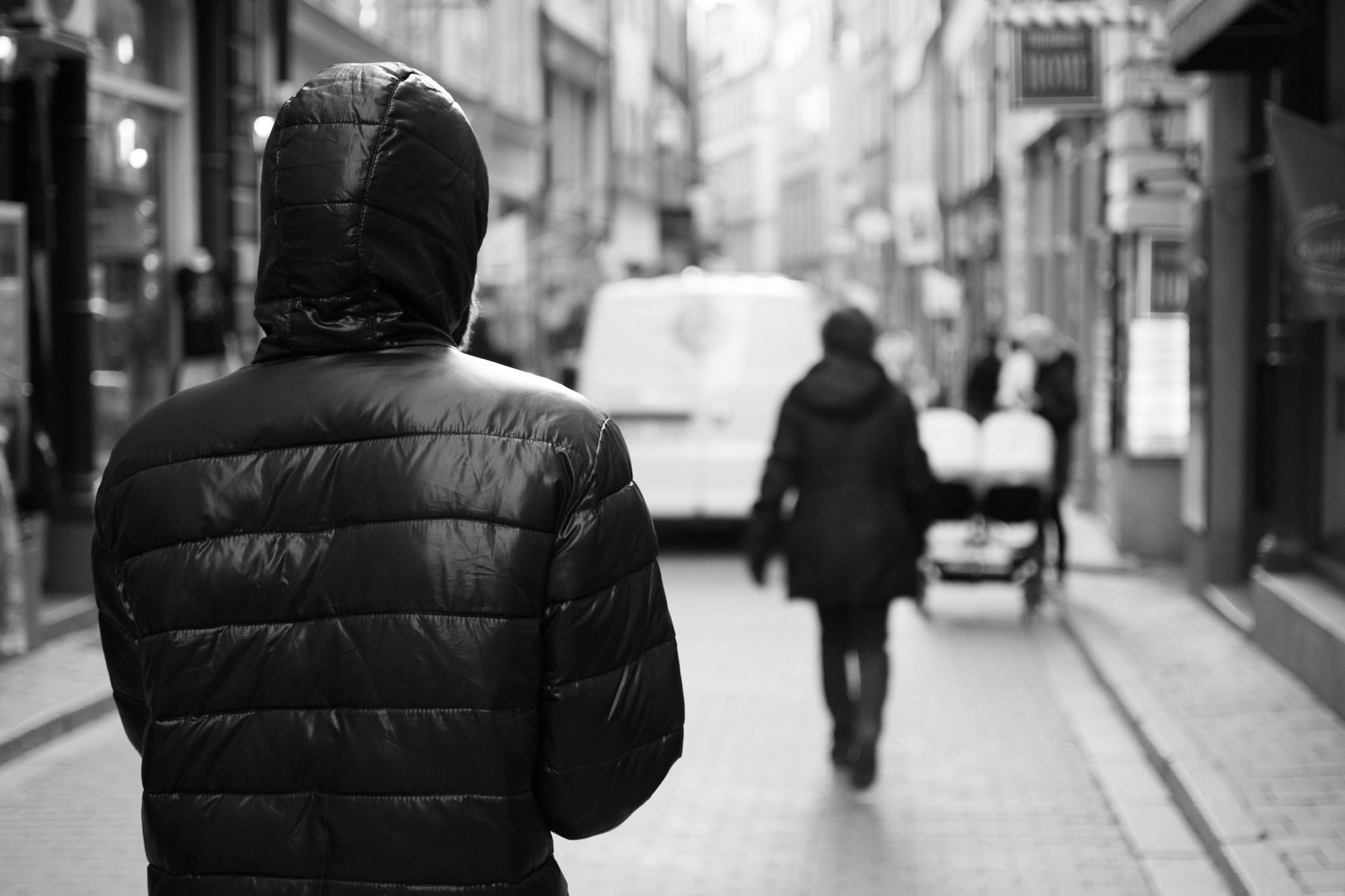There is a national epidemic of missing girls and women. This is the story of a friend who has become one of these grim statistics.

“Stalker.” (Patrik Nygren, Flickr, CC BY-SA 2.0)
By Chris Hedges
ScheerPost.com
 There is a national epidemic of missing girls and women. This is the story of a friend who has become one of these grim statistics.
There is a national epidemic of missing girls and women. This is the story of a friend who has become one of these grim statistics.
A few days before Meghan Marohn, a 42-year-old English teacher at Shaker High School in Latham, New York, disappeared, she confided to friends that she had gone into hiding to escape from a man who had “brutally harassed and intimidated me because I wouldn’t sleep with him.” She said she was too afraid to stay at home, especially when she saw him drive by her house. She was granted a leave from teaching and camped out at The Red Lion Inn in Stockbridge, Massachusetts. She was last seen on March 27. It was cold, snowy and windy.
Her black Subaru was found at a trailhead on Church Street in South Lee at the 46-acre Janet Longcope Park about two miles from the inn. Her car was unlocked. The car keys, the hotel key, her daily diary, her good luck stuffed animal Bun, her computer, her wallet, the book she was reading, The Willoughbys by Lois Lowry, and cell phone were missing. The last ping from her cell phone did not come from the loop trail in the park, but in a rural residential area across the road. Police combed the park and surrounding area. Nothing. It has been nearly 14 weeks.
Was Meghan murdered? Was she abducted and taken somewhere? Did she go underground? Did she walk into the nearby Housatonic River with stones in her pockets to drown herself the way Virginia Woolf, whom she idolized and who was a victim of sexual abuse, did on March 28, 1941, in the River Ouse? Meghan, a poet and gifted writer, was a voracious reader. She would have been aware of the date of Woolf’s suicide which so eerily coincides with her disappearance. But, being a writer, as well as deeply empathetic, it is doubtful she would have killed herself without leaving a note.
All of this is speculation. What is not speculation is that, like many girls and women, she feared for her life because of male violence. She would not have gone to the Red Lion Inn if she had not been afraid. If she were not afraid, she would, I expect, still be with us.
Over a quarter of a million girls and women go missing in the U.S. every year. Male-perpetrated violence, especially domestic violence, is intimately linked to missing girls and women. The FBI reports more than 80 percent of violent crimes are committed by men. That is 99.1 percent of rapes committed by men and 88.7 percent of murders and manslaughters committed by men.

Red Lion Inn in Stockbridge, Massachusetts, where Meghan Marohn was staying when she disappeared on March 27. (Joe Mabel, CC BY-SA 3.0)
Meghan was white and well-educated. She was loved and respected in her community. Her case was covered in the local press. But poor girls and women, especially of color, disappear in the U.S. with little investigation or public outcry. Some 40 percent of all girls and women reported missing are people of color – 100,000 out of 250,000 – although they are 16 percent of the population. In Montana, 26 percent of all missing person reports are Native girls and women who make up less than 7 percent of the state’s population. Few, outside the small circle of family and friends, care.
Epidemic of Male Violence
This epidemic of male violence against girls and women is not a law enforcement priority. It is also not, as it should be, part of our national discourse. But Meghan, whom I knew, like all these girls and women, should not be allowed to become statistics. Their stories, which include weeks, months and even years of abuse and sexual assault, lead to severe psychological and physical distress. Meghan, sadly, was hardly alone.
I met Meghan in September 2011 at the Occupy Wall Street encampment in Zuccotti Park. She was, at the time, teaching English at Chatham High School in New Jersey. She approached me in the park dressed in a wild cacophony of cast-off clothes – she only shopped at thrift stores – and a mass of thick red hair. She asked me to speak to her high school philosophy club. I don’t usually speak at high schools, but her passion, her persistence, her literacy and brilliance and her devotion to her students led me to agree. She used the same powers of persuasion to get Cornel West to visit her students.
She was a teacher at my HS when I graduated in 2017, this pic is about 5 years old but it is a good deal clearer if it helps. pic.twitter.com/SEZAnzhfkr
— gernard (@gernard15) April 1, 2022
I often speak at The Sanctuary for Independent Media in Troy, a remarkable grassroots organization in an old church that runs a small radio station, community science lab, cultivates urban gardens, programs for inner-city youth, gives space to artists and has broadcast quality television equipment to record lectures and make documentaries.
Not surprisingly, once she moved to Troy, Meghan gravitated to The Sanctuary. I would see her there. Steve Pierce and Branda Miller, who run The Sanctuary and who organize a vegan dinner before my talks, would invariably wrench me away from a heated discussion with Meghan about some poet or author to go into the sanctuary and give my lecture.
Meghan disliked Ernest Hemingway for his misogyny and cult of masculinity, which mar Hemingway’s work, but I admire Hemingway for his writing on war, which is some of the best anti-war literature of the 20th century, as well as for his lyricism and rhythm. This would have us throwing scenes from A Farewell to Arms, The Sun Also Rises and For Whom the Bell Tolls, as well as his short stories, back and forth. We agreed that Moby Dick, which we had each read multiple times, is the greatest American novel. Moby Dick always led us to trade effusive encomiums since, like the plays of William Shakespeare, Herman Melville delineates human nature, the repressive hierarchy of Western society, the demented and doomed quests that seduce us, our commodification of nature and the moral neutrality of the universe. Melville lived for a time in Troy. His dilapidated house, rarely visited, is a museum Meghan arranged on one trip for me to tour.
She loved her students. She spoke about them constantly. Many were poor, some the victims of gun violence, which devastated Meghan. She could never come to grips with the cruelty of this world.
Long Field Trips
She was of Irish descent. On the night before St. Patrick’s Day she would stay up late baking loaves of soda bread for her students. She took her students from New Jersey on long field trips in New York, for which they were required to bring their journals and write.
She would have them visit the carousel in Central Park. In the final scene in The Catcher in the Rye Holden watches his little sister – Phoebe – go around and around on it, trying to catch the golden ring dangling from the dispenser. Her students would sit in front of the carousel and write their reflections on the book.

Central Park Carousel in New York City, December 2008. (Chris Devers, Flickr, CC BY-NC-ND 2.0)
She led her students up the metal ladders on the Rutherfurd Observatory on top of Pupin Hall at Columbia University in the rain, over the Brooklyn Bridge, to The Cathedral of St. John the Divine, the Gowanus Canal in Brooklyn and the Tenement Museum.
She took them on edible food tours of Central Park and out at night to look through telescopes at the rings of Saturn. She was one of those unique, impassioned, endlessly curious and deeply caring teachers who transform young lives. In Troy, although chronically short of money, she could be found at the downtown diner at night feeding kids she mentored who came from low-income families.
Meghan would become hot with anger at the focus in schools on “vocational” texts, designed to teach students about the “real” world, by which school administrators meant the world of technology, business and careerism.
This was not the real world to Meghan. How were her students to discover and speak about love if they did not read Anna Karenina, Pablo Neruda and Romeo and Juliet? How were they to understand war if they did not read All Quiet on the Western Front and Johnny Got His Gun?
How were they to grasp the mechanics of tyranny if they did not read George Orwell, Aldous Huxley and Mikhail Bulgakov? How were they to explore race if they did not read W.E.B Du Bois, James Baldwin and Toni Morrison? How were they to cope with the capacity of human evil if they did not read the literature of the Holocaust, which she taught to high school seniors? How were they to begin to process the inevitability of despair, disappointment, and death if they did not read Anton Chekhov, Emily Dickinson and Sylvia Plath?
The Weight of Sadness
She gave too freely of herself. She was an easy mark for anyone with a sad story. She should have built better defensive walls. She was too good for this world, too trusting, too caring and too vulnerable. She paid for this by having her heart broken many times. She carried under her exuberance the weight of sadness that comes with loving without restraint.
When Meghan’s brother Peter Naple went to collect Meghan’s things from her room at The Red Lion Inn, he found these books: Sing, Unburied, Sing by Jesmyn Ward, The Heights of Machu Picchu by Pablo Neruda, The Mists of Avalon by Marion Zimmer Bradley, Tripmaster Monkey by Maxine Hong Kingston, Howard’s End by E.M. Forster and Favorite Folk Tales from Around the World edited by Jane Yolen.
Part of Meghan’s charm was that she was quirky, in the way iconoclasts and artists are often quirky. It wasn’t only her clothes, which looked like they had been lifted out of the discount barrel of the thrift store, which they probably had, but her connection with a universe she believed was a living entity, one filled with mysterious spiritual forces.
She adored Carl Sagan – she named her cat after him – and would remind her students, as Sagan said, that “we are made of star-stuff.” She often went on long walks in the woods, even in the rain. She would find strange fungi or go out on successive nights to watch the phases of the moon, sending pictures of these wonders, missed by so many in the hectic pace of daily life, to her friends. How could we ignore these miracles?
She was a local leader for Extinction Rebellion, which uses non-violent civil disobedience to halt our march towards mass extinction. She was in jail after an Extinction Rebellion protest in New York City when she got word that her mother, also a teacher, had suffered a brain aneurysm and was on life support. The loss of her mother only intensified her interest in the mystery of life and death. She haunted graveyards. Periodically the last text her mother sent to her would pop up on the screen in her Subaru. It read: “Mama 12:00 am. Meg – I l9ve you. There Are no guarantees in life. LBve for the moment now.”
Meghan was sure these intermittent messages had been sent by her mother’s spirit.
She would set up her typewriter at the Troy Flea market, along River Street during the Enchanted City festival, at Troy Night Out on the last Friday of every month or on Freedom Square with a sign that read: “Troy Poem Project.” She would coax a poem out of whomever sat next to her, typing it out on a piece of paper and then giving it to the newly minted poet. Or she would help children type letters to parents in prison.
Her brother Peter created a website, findmeghanmarohn.com. It has a message board for tips. But the case is growing cold. It has been a long time.
Meghan’s magnetism makes it hard to believe she is gone.
But is she? Isn’t it that we feel the overwhelming energy she dedicated to the good? The prophets remind us that love is the greatest force on earth, that by loving others, especially those who are neglected, lonely and abused, hope and light are not extinguished.
Meghan lived in the real world, the one many around her could not see. This was her curse, and her gift.
Chris Hedges is a Pulitzer Prize–winning journalist who was a foreign correspondent for 15 years for The New York Times, where he served as the Middle East bureau chief and Balkan bureau chief for the paper. He previously worked overseas for The Dallas Morning News, The Christian Science Monitor and NPR. He is the host of show “The Chris Hedges Report.”
Author’s Note to Readers: There is now no way left for me to continue to write a weekly column for ScheerPost and produce my weekly television show without your help. The walls are closing in, with startling rapidity, on independent journalism, with the elites, including the Democratic Party elites, clamoring for more and more censorship. Bob Scheer, who runs ScheerPost on a shoestring budget, and I will not waiver in our commitment to independent and honest journalism, and we will never put ScheerPost behind a paywall, charge a subscription for it, sell your data or accept advertising. Please, if you can, sign up at chrishedges.substack.com so I can continue to post my Monday column on ScheerPost and produce my weekly television show, “The Chris Hedges Report.”
This column is from Scheerpost, for which Chris Hedges writes a regular column. Click here to sign up for email alerts.
The views expressed are solely those of the author and may or may not reflect those of Consortium News.

I don’t know if this exists, or not, but I think there needs to be a safe register for women who feel threatened for any reason to record the details of the threat, and that the details remain confidential unless they are reported missing or are hurt in any way. Where the threatened person can update the details of the threat if it goes away and any persons named in the register will not be investigated – unless there is an incident. This would protect both the threatened person and any named persons, but most importantly help police and investigators.
Scrolling through articles related to Meghan Marohn’s disappearance (all, ominously, months old) there doesn’t appear to be any mention of a man stalking her. This fact is, of course, hugely significant. I’m guessing that perhaps the police wished to keep this fact under raps during the investigation. The posting of this revealing article months after the fact also seems related to this early calculated omission. Beyond the mystery is a remarkable, beautiful soul who enriched all the lives she touched. John Stewart Mills father told him that we should all leave the world a little bit better than it was when we entered. Meghan Marohn seems to embody this ideal. It’s maddening and tragic that such a woman could be violated by the misogynistic world we inhabit. The story of human “civilization” is that of half a boat trying to stay afloat; a grotesque imbalance of masculine and feminine. The oppression and degradation of women has robbed us all of a better world – and now is killing us.
I am all against violence by men against women, and I am also against blaming the victim. But this story is about two topics: the tragic story of Meghan Marohn, a White, well educated professional woman, and the second story is about misogynist men victimizing women, mostly poor women of color. These two stories intersect of course.
What struck me was that an intelligent, highly educated woman in her 40’s would be a passive victim of a criminal aggressive man. Did she not know she can go to the police and file a complaint against an aggressive man who “brutally harassed her and intimidated” her? Did she not know that she can go to a court of law and obtain an order of protection, which would make it possible for him to get arrested and imprisoned should he come anywhere near her again? Just these two steps might very well have saved her life. It is very sad that women have to learn to defend themselves, but as society grows more aggressive and more violent, those who adapt best to a changing environment will have the best chance for survival.
Marvelous tribute to a remarkable being.
Heartbreaking. Meghan sounds like a rare woman. I hope she’s found. It’s outrageous that a woman, women, can be so threatened by a man and receive no real protection from her community or law enforcement.
A very touching tribute to a very special soul. Bringing awareness to missing women and children is greatly appreciated. Sadly, it affects both genders but certainly, not equally.
Thank you, Chris.
What a beautiful tribute to a gem of a human being. Hedges is another.
Beautifully written. Heartbreakingly piongant.
Thankyou — a most compelling essay.
While, in his article, Chris Hedges tells an empathetic story of how a female friend of his, afraid of a man harassing and intimidating her, fled to rural Massachusetts and went missing there, he uses this sad and touching story as an example of “a national epidemic of missing girls and women”. In fact, according to the very data used in the article, there is a no epidemic of this kind primarily affecting girls and women, but if the high number of missing persons in the USA in 2021 is to be called an epidemic it is one affecting women and men almost equally:
The statistics linked by Hedges: httxs://www.statista.com/statistics/240387/number-of-missing-persons-files-in-the-us-by-age/ – shows – in USA in 2021, the number of missing male persons does not only not differ much from the one of missing female persons, in fact, even some more boys and men are missing – about 264000 – compared to girls and women missing – about 257 000. As for the age under 21, more girls are missing than boys, while above 21 more men are missing than women.
We might assume, Chris Hedges was so moved by the sad story of his friend that some way or other he got him interpreting the underlying statistics wrong, or we might consider it somewhat telling that even this great journalist somehow generalizes from the sad fate of the woman large parts of this article are devoted to not to all humans, but only to all girls and women – and this even in face of the fact that the very statistics about missing persons he himself links to in his article tells a different story.
I am glad, some of the fellow commentators show some empathy for both women and men, in the way a singer-songwriter famous in Germany puts it in a line of his 1984 song “Maenner” (men): “Men are human beings too.” – for those interested in the song, the name of the singer is Herbert Groenemeyer.
love it
Many of the responses to male violence against women are emotive calls for more punishment and incarceration of men, in a nation which already does that to a degree vastly greater than does any other. Is it working? It doesn’t seem so. More radical ideas are needed which treat men as human beings and ask why a tiny minority of men inflict violence on women because they are women. Bear in mind that the majority of male violence is directed at other men for a variety of reasons, but some men’s deep hatred of women has causes. What are they? Do they include socialisation, evolution, political factors, biology…? How can they be addressed?
Thank you for saying this. In a society that glorifies violence, most especially through war, males grow up being expected to participate in military violence and it destroys many of them. Unfortunately, this often results in violence against women. Our society is sick. People like Meghan try and change it, but short of the elimination of capitalism and its never-ending use of violence against human beings, nothing will be achieved in that direction. I hope that Meghan is alive, but I am not optimistic.
Thank you.